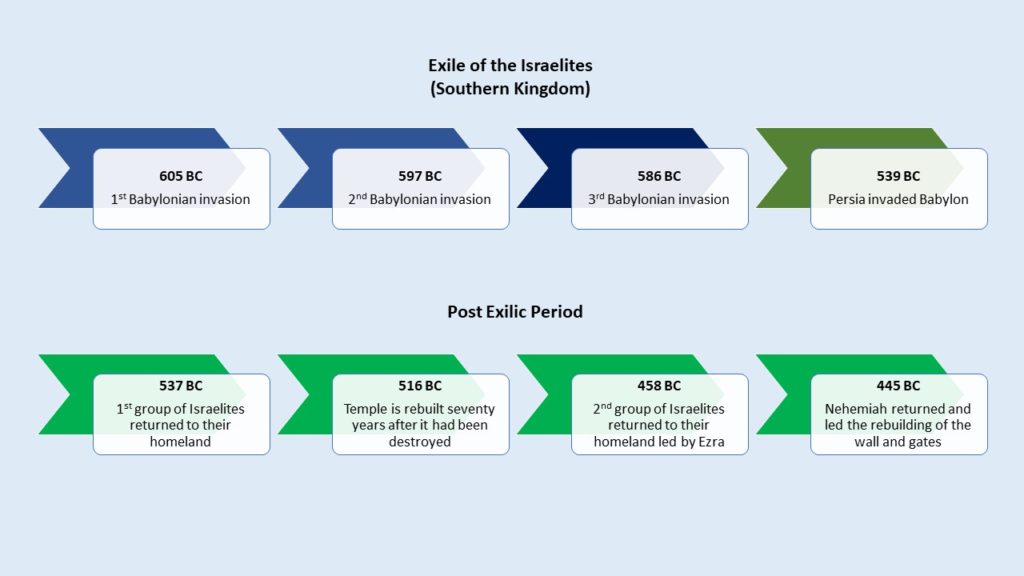
I was asked to teach the adult Sunday School lesson based on Nehemiah 2:11-18. I was excited because I had been studying the Old Testament. From my study, I finally understood how the split occurred creating the Northern and Southern kingdoms. I understood the impact of the Assyrian invasions of the northern kingdom vice that of the Babylonian invasions of the southern kingdom. These studies helped put Nehemiah’s story in context for me. As I prepared to teach this lesson, of course, I had to read all of chapters 1 and 2. Here are some prayer lessons I learned from Nehemiah.
- “When you pray, move your feet.”[1] Hearing bad news from back home, Nehemiah was distressed. But he did not wallow in that distress, Instead, he prayed earnestly to God (1:5-10). Just as importantly, with the conviction of his fervent prayer brought about by faith in his God, Nehemiah “moved his feet.” In other words, he acted. He asked his boss, King Artaxerxes, for a leave of absence; for official letters to secure traveling mercies; and for enough resources to rebuild Jerusalem’s walls and gates (2:5-8). “Prayer alone should not be the sole response to life’s trials.”[2] I must be involved in the solution I seek. Like Nehemiah, I must be prepared to “move my feet” when I hear from God. Pray. Move. Do. In the name of God.
- Ask for God’s wisdom before I open my mouth. When it was report card time in my house, I learned that my reaction was always better when I first prayed for God’s presence, calm, and words. I like to think that Nehemiah had the same philosophy. When his boss asked why his countenance was distressed, Nehemiah prayed before he spoke (2:4). The actual prayer is not given, but I surmise it was a quick, but mighty, prayer asking God for the right words to speak to Artaxerxes. Maybe Nehemiah prayed that God would make the king amenable to his request. Whatever he prayed, Nehemiah had a successful conversation with the king. I cannot go wrong by asking God to guide my tongue. Praying before speaking allows God to control what is said. It brings a sense of calm to me and the situation.
- Teach our children to pray. Nehemiah was an Orthodox Jewish man who was born, raised, and worked in Persia. (By the time of Nehemiah, the Babylonians, who had conquered and exiled the Israelites, had been conquered by the Persians.) He was four or more generations removed from anyone who had lived in Jerusalem. (see Timeline below) When he prayed to God in chapter 1, he
- lifted his adoration to God;
- confessed his sins, the sins of his family, and the sins of all Israelites;
- acknowledged the covenant between God and Moses;
- and asked for success in his mission.
It is obvious from this prayer that he had a relationship with God. He knew of God’s covenant with His people. He knew his people were in this predicament because of their disobedience. Being so far removed from “native” Israelites and living among his conquerors, how did he know? I surmise that he knew because in exile, the Israelites were allowed to keep their history, story, and culture alive. They recounted through the generations who they belonged to, what they had lost, and what they could gain. Nehemiah knew to pray and to whom to pray because the generations before him had taught him to pray. We must do the same. We need to ensure our children know the story of how God provides. We need to teach our children to pray unceasingly. We need to help our children build their relationship with God.
Reflection: Do you bring God into your situation? Are you ready to “move your feet” when you hear the gentle whisper? Are you helping the next generation know who God is?

[1] African proverb
[2] “Nehemiah: The Captive Cupbearer Rebuilds a Nation.” Prophets Faithful to God’s Covenant: AMEC Sunday School Quarterly. (Spring Quarter 2021). Pages 41-46.